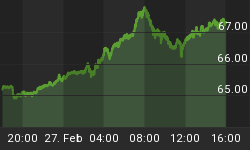
The Federal Reserve knows the market examines every word from a governor's mouth or included in a formal policy statement. Therefore, when the Fed starts making explicit references to ending asset purchases or removing policy accommodation, it hints strongly at their desire to move away from non-traditional forms of stimulus. Wednesday brings the release of the Fed's minutes. A logical place to look for clues is the last policy statement:
To support continued progress toward maximum employment and price stability, the Committee today reaffirmed its view that a highly accommodative stance of monetary policy will remain appropriate for a considerable time after the asset purchase program ends and the economic recovery strengthens.
When the Committee decides to begin to remove policy accommodation, it will take a balanced approach consistent with its longer-run goals of maximum employment and inflation of 2 percent.
The key portions are "after the asset purchase program ends" and "decides to begin to remove policy accommodation". These concepts could reappear in Wednesday's Fed minutes. From Reuters:
Investors have also started to focus on the Fed's minutes from its July 30-31 meeting, to be published on Wednesday. The minutes could fuel expectations the Fed will start reducing its $85-billion per month bond purchase program. Such a move could further boost U.S. Treasury yields, enhancing the attractiveness of dollar-denominated assets.
September Taper Still Expected

As we have stated numerous times in the past, we believe (a) the base case is for tapering at the September meeting, and (b) tapering is about bubble management, rather than a strong economic recovery. It is also noteworthy that President Obama has repeatedly talked about avoiding new asset bubbles. We are not alone on September tapering as the base case. From Bloomberg:
U.S. central bankers meet in Jackson Hole, Wyoming this week to discuss monetary policy. Officials will start to scale back bond buying next month, according to 65 percent of economists surveyed by Bloomberg from Aug. 9-13. They will begin by reducing purchases to $75 billion a month, the median estimate showed.
Investment Implications
Our market model has reduced risk, but still has us in a net-long position. As shown in the chart below, the S&P 500 would face a big bull/bear test if it rallies back toward 1680-1685. Bulls are trying to hold support near 1646. A bullish wild card could come in the form of a somewhat unexpected pro-QE and anti-tapering tone in Wednesday's Fed minutes.

If support holds, we are open to redeploying some cash at a measured pace below 1685. Above 1685, our model will have us add to our positions in technology (QQQ), small caps (IJR), mid caps (MDY), and the S&P 500 (SPY) at a faster rate. As of Tuesday afternoon, the bulls still maintained a slight advantage over the bears from a technical perspective. The balance of power may flip if the S&P 500 closes below 1646 for more than a day or two.















